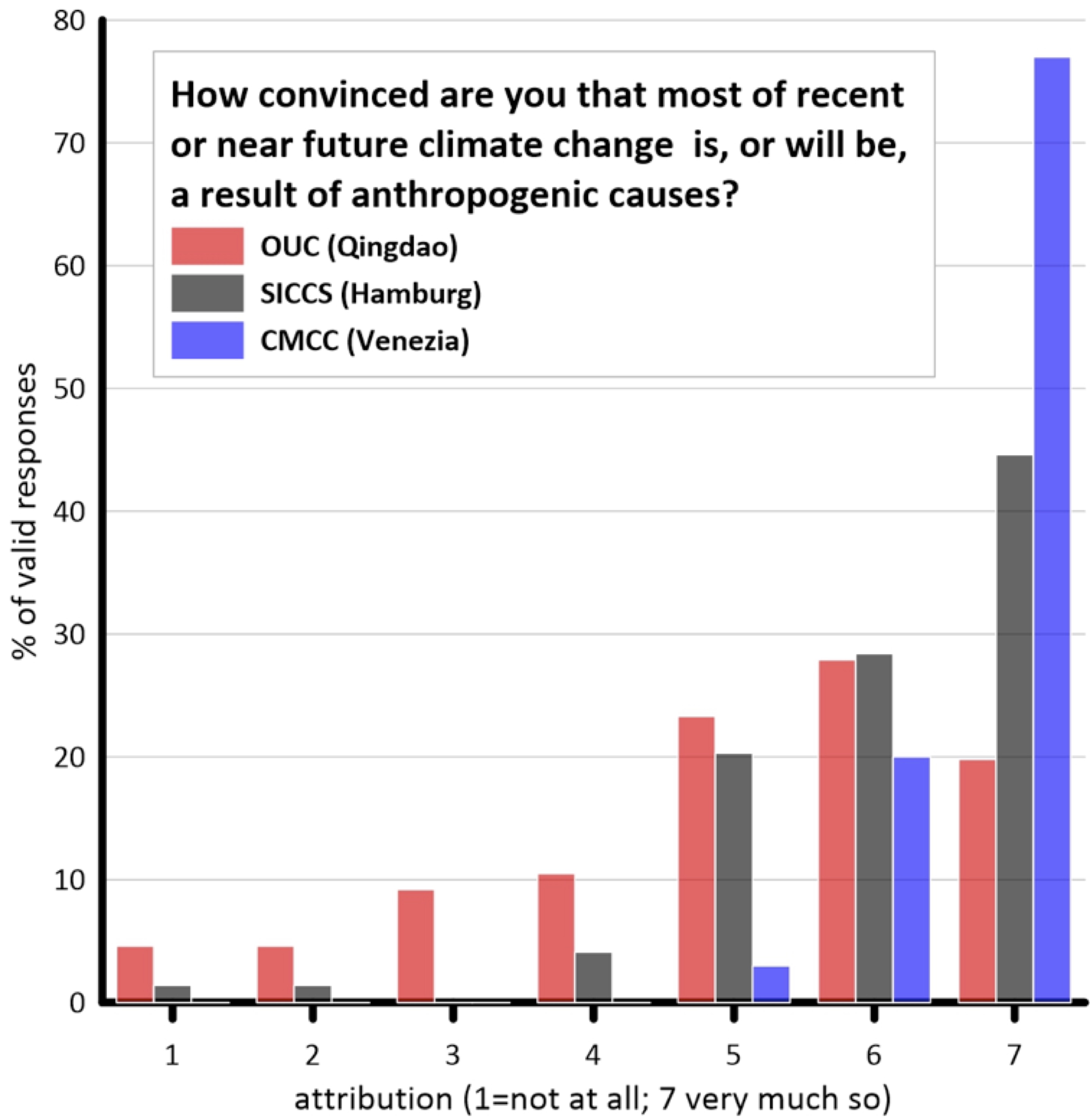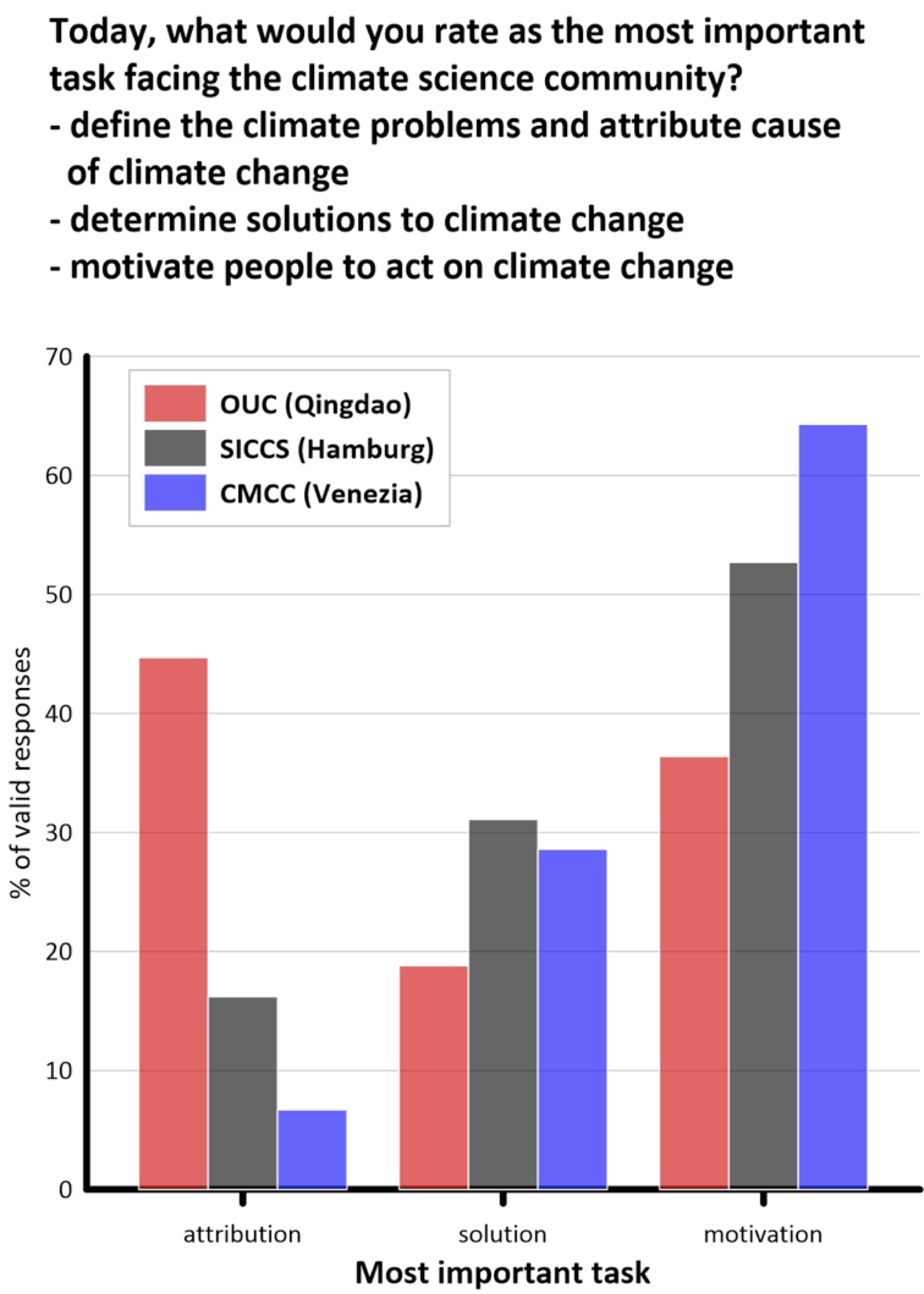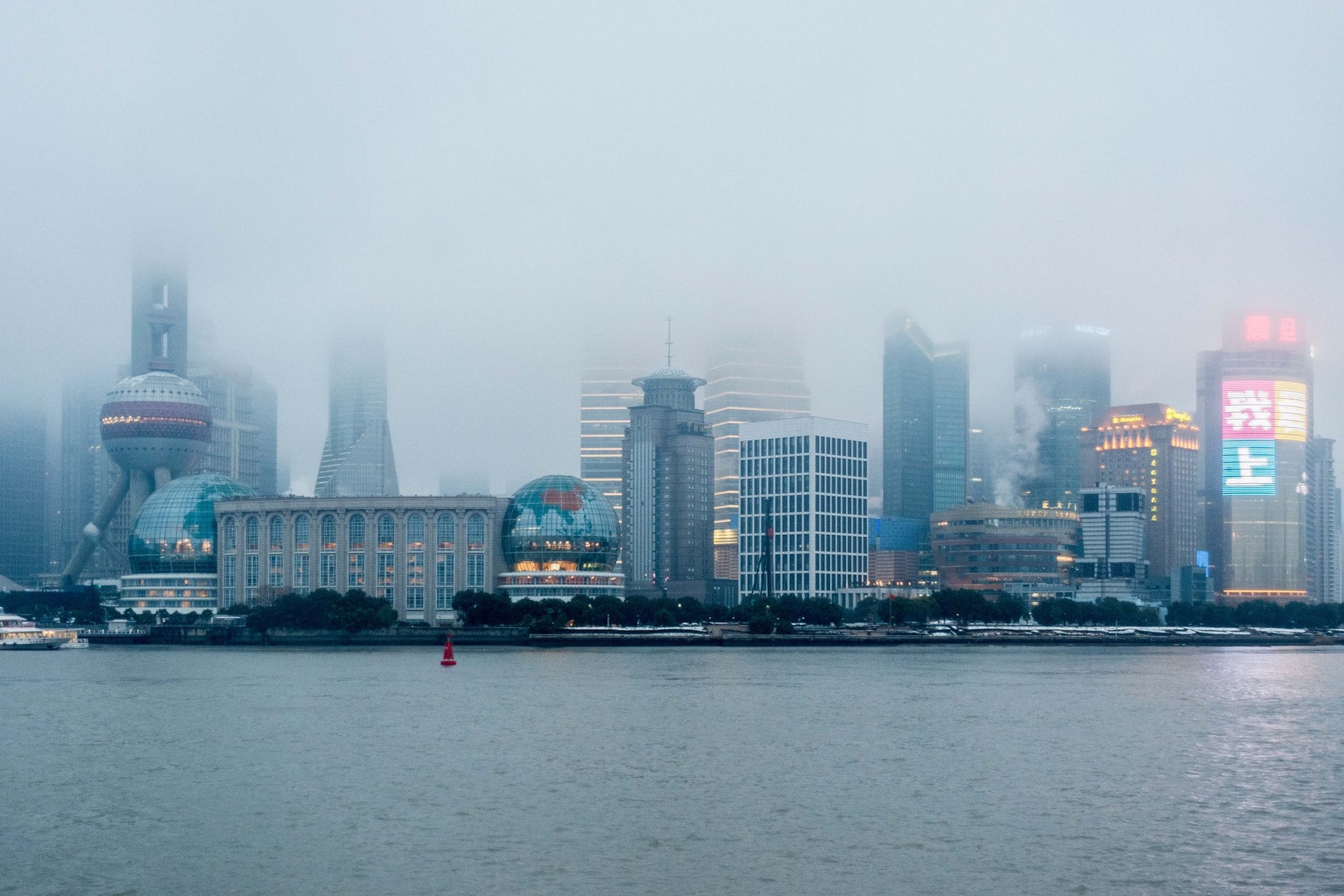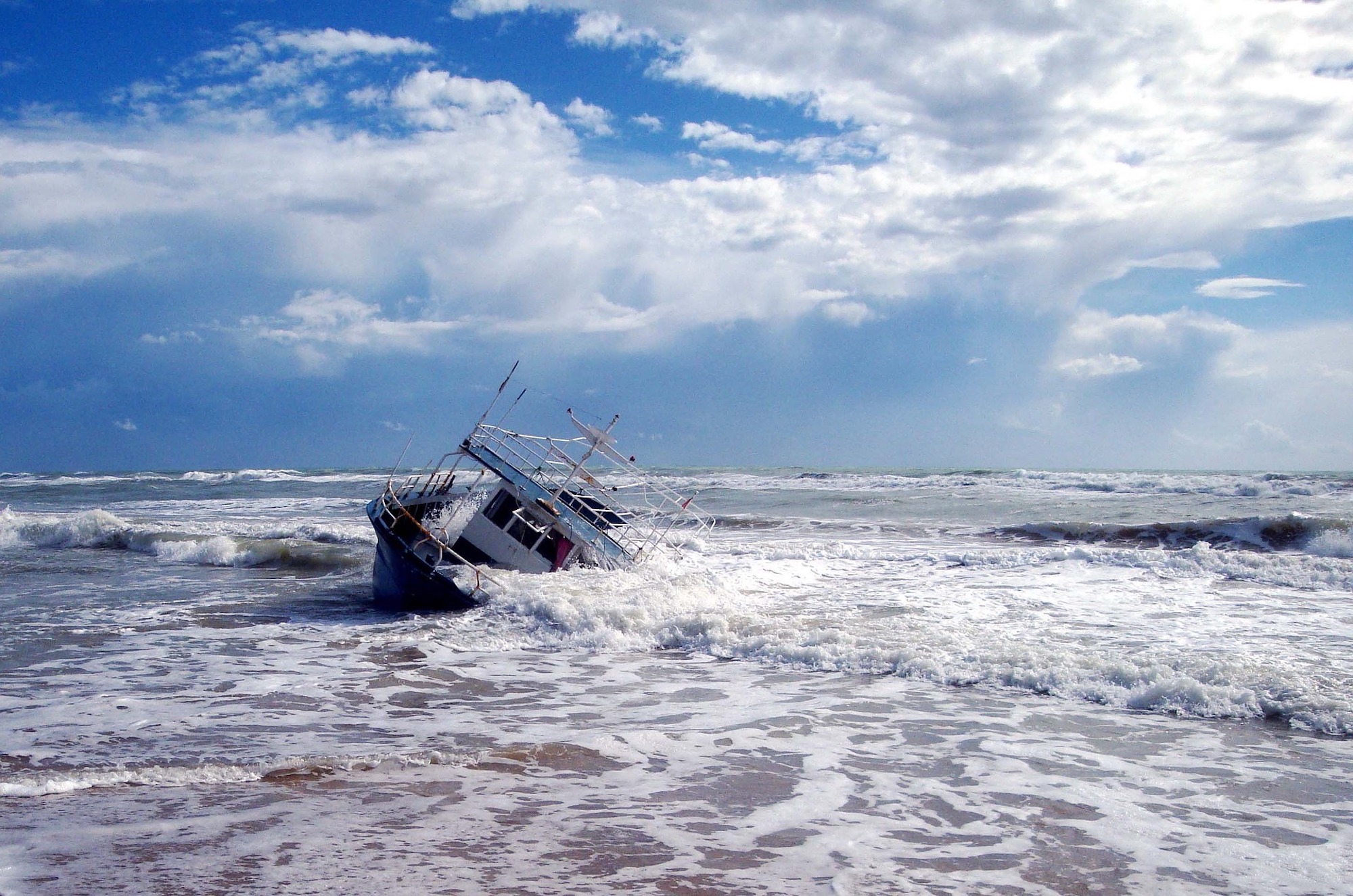Hans von Storch and Silvio Gualdi
Being trained as natural scientists, some climate scientists began in the 1990s their excursions into social sciences when it became clear that climate science is not just an innocent natural science project, which is providing numbers, predictions and context for the political decision process [E.g., Stehr and von Storch, 1993: Stehr, N., and H. von Storch, 1995: The social construct of climate and climate change. – Clim. Res. 5, 99-105]. They began to understand that climate scientists are social actors, have preferences, argue for certain political positions, have a “Weltbild” how the world should look like. For social scientists this is a trivial assertion, for some natural scientists it is border to an insult.
Dennis Bray and Hans von Storch began surveying climate scholars about their thoughts, beginning in 1996 and ending in 2015. The five “Bray-and-von-Storch surveys” [For an overview, see https://www.researchgate.net/project/The-Bray-and-von-Storch-surveys-among-international-climate-scientists] showed the growing agreement among the climate science community that climate is indeed changing, and an explanation is only possible when greenhouse gases are considered dominant drivers. They revealed also that climate science is in a “post-normal condition” [see Funtowicz, S.O. and J.R. Ravetz, 1985: Three types of risk assessment: a methodological analysis. In C. Whipple and V.T. Covello (eds): Risk Analysis in the Private Sector, New York, Plenum, 217-231; von Storch, H., 2009: Climate Research and Policy Advice: Scientific and Cultural Constructions of Knowledge. Env. Science Pol. 12, 741-747 http://dx.doi.org/10.1016/j.envsci.2009.04.008] , when the political utility is becoming a key issue.
These extensive surveys of the international climate scholar community were in recent years complemented by short surveys in specific local academic groups. In this report, we present results from a “local” survey at CMCC in Venezia and Bologna, run in 2018.
Local surveys – from Qingdao to Venezia
The key questions of the “local surveys” are, if scholars at a scientific site would consider climate change real, and if they would accept the explanation of elevated greenhouse gases. On the issue of “climate and society”, the question was asked if the climate issue is mostly a scientific issue or a political issue, and if the main task of present climate science would be solving scientific issues, of finding solutions to the climate problem or to motivate the public to fight climate change [For the exact wording of the questions, see below. ].
So far four such surveys have been done: at the Ocean University of China in Qingdao in 2015/16, at the graduate “School of Integrated Climate System Science” and the master’s course of the Cluster of Excellence Integrated Climate System Analysis and Prediction (CliSAP) at the University of Hamburg in 2017; at the CMCC in Venezia/Bologna in 2018 and a fourth one at a technical university in Germany. The results of the first two surveys are published and discussed [von Storch, H., Chen X, B. Pfau-Effinger, D. Bray and A. Ullmann, 2019: Attitudes of young scholars in Qingdao and Hamburg about climate change and climate policy – the role of culture for the explanation of differences. Advances in Climate Change Research, online: 10.1016/j.accre.2019.04.001]; the results of the third one are presented here in some detail; the fourth will be made public at a later time.
The request for participation was distributed by Dr. Silvio Gualdi of CMCC by e-mail to about 200 CMCC researchers and PhD students (including those of the CMCC/University of Ca’ Foscari program). A total of 30 filled surveys were returned to Dr. Gualdi. For comparison: in Qingdao were also about 200 scholars and students approached, and 87 responded; in Hamburg 62 of 116 addressed students returned the surveys.
For the two questions on the reality of climate change and the explanation, a 7-step response scale was offered, with a 1 representing a “not at all”, a 7 a “very much”; also a “don’t know” was an option for response.
To “How convinced are you that climate change, whether natural or anthropogenic, is occurring now?” 30 respondents ticked off the 7, indicating a very high agreement.
Enlarge

The response to “How convinced are you that most of recent or near future climate change is, or will be, a result of anthropogenic causes?”, the response was a bit more structured, with 23 votes for the “very much”-7, 6 votes for the slightly more cautious “6”, and one for the doubtful but still positive “5” (Figure 1). If we interpret answers 5-7 as support, all respondents subscribed to the understanding that anthropogenic causes are behind climate change, even if a quarter or so had some minor reservations.
The recorded confidence in both Qingdao and Hamburg was lower (Figure 1). In Hamburg, 94% of students go for the options “5-7” voicing agreement, with little doubt that the change is due to anthropogenic causes, whereas this number is down to 71% in Qingdao [Note that in Figures 1 and 2 in von Storch et a., 2019, mistakenly wrong numbers are shown. The wording is in order, though].
Enlarge

The two questions on climate science and society were “Today, climate change is mostly a…” with the response options “scientific issue”, “public/political issue” and “don’t know”, and “Today, what would you rate as the most important task facing the climate science community?” with the response options “define the climate problems and attribute cause of climate change”, “determine solutions to climate change”, “motivate people to act on climate change”, and “don’t know“.
With the first, concerning the character of the issue, 9 of the 30 CMCC respondents went for “scientific issue”, but 20 for “public/political issue”; one ticked off both options. In Hamburg and in Qingdao, the frequencies were identical, after taking out the unknown-answers, namely 28% for the scientific issue, and 72% for the political issue, which compares about well to the CMCC numbers, with 31% for scientific issues, and 69% for the public/political issue.
This result supports the notion of the post-normal character of climate science, which is further strengthened by the 18 CMCC scholars opting for the “motivation of people” as the most important task of climate community (Figure 2). A minority of 8 suggested to focussing on solutions but mere 2 opting for the classical scientific task of dealing with scientific challenges (3 responses were not counted, as two options (solutions + motivation) were ticked off.).
The responses to the question on the main task in Qingdao and in Hamburg differed from those at CMCC: a majority of 44% of the scholars of Qingdao opted for the “scientific issues” of defining the problems, whereas in Hamburg only 16% and in Venezia even less, namely 7%; the “solutions” were selected in Qingdao by about 18%, in Hamburg about 32%, and in Venezia by 28%; for the “motivation of the public”, a majority was logged in Hamburg (52%), and in Venezia with 64%, but mere 35% in Qingdao.
Conclusions
The results concerning the reality and character of climate change were similar in the three surveys, but the confidence was much larger at the two European sites, with a very large majority at CMCC. The differences between the China site and the European sites is plausibly related to cultural differences5. That the confidence is much higher in Venezia/Bologna than in Hamburg may be related to the timing – the Hamburg survey was taken prior to the Paris accord, and Venezia/Bologna after. But other factors may be at work, also.
The assessment, that the climate issue represents a public/political issue and less so a scientific issue is shared among the scholars and students at the three sites. However, the role of climate science in society is rather different. In China, where traditionally the responsibility for societal problems is assigned to the government, whereas in the “west” civil society activity is common. In Europe, climate science is obviously in a post-normal phase.
The similarity of the responses given at CMCC and at SICCS indicating that the scientific mission should be driven by the political need for “a motivation of the public” is not a singularity in Hamburg, but present, even with stronger emphasis, also at CMCC. Both institutions are devoted to the study of the climate problem. Again, the difference could be in part be related to the time difference.
The overall “European” pattern – less emphasis on the “scientific attribution issue”, but most efforts for “motivation of the public” – could in principle be due to a self-selection process, namely that those who feel the need for political engagement study climate sciences; however, the forth survey, at a technical university in Germany (not yet published) demonstrate that this is not the case.
It remains to be seen which consequences this prioritization of political issues over scientific issues in the “main tasks” of climate science will have to the functioning of climate science and of its authority in informing the political decision process.






